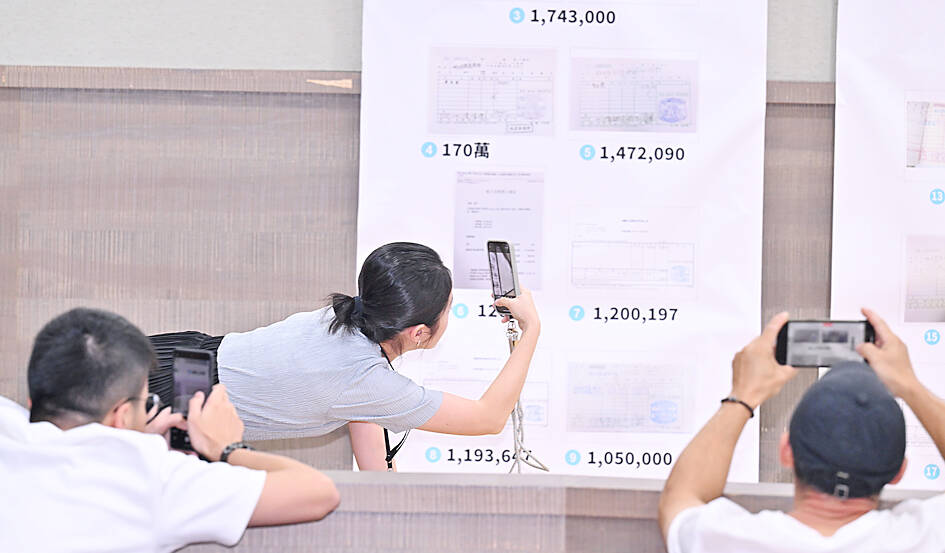The Legislative Yuan’s Budget Center has called for a review of rules on political donations and how to regulate new modes of donating after it found that less than half of related audits in the past decade resulted in penalties.
Penalties were only imposed in less than half of the cases, especially in cases in which candidates running in elections were involved, the center said in a report released this week.
The Control Yuan is responsible for scrutinizing asset declarations of elected officials and civil servants, as well as auditing political donations for individual candidates and political parties.

Photo: Liu Hsin-de, Taipei Times
For next year’s budget, the Control Yuan has set aside NT$610,000 (US$19,044) to check bank accounts of candidates and parties accepting political donations, review accounting reports and conduct audits of selected cases, the report said.
The Control Yuan has audited about 25 percent of political parties’ declarations, 44 percent of those by presidential and vice presidential candidates, 66 percent of those contesting a legislative seat and 15 percent of local elections, it said.
Its review covered 2014 to last year, totaling 1,548 cases, 718 of which resulted in penalties, or 46.4 percent, while those without penalties were 811, or 52.4 percent.
The highest proportion for those who were not penalized were candidates in elections at 72.4 percent, while the most imposed penalties involved contraventions and illegal conduct relating to donations from foreign sources, donations exceeding the upper limit, submitting accounting reports past the due date, failure to submit an accounting report, accepting unlawful donations and depositing money into a bank account dedicated to political donations past the 15-day deadline.
When it comes to candidates who were not penalized, it is likely due to the Control Yuan not finding fraudulent reporting or accounting discrepancies, center officials said.
However, the lack of personnel for investigations and limited authority to carry out audits, were also another factor, they said, adding that they had to close some cases due to lack of evidence.
Those who contravene the Political Donations Act (政治獻金法) could be fined up to double the amount of the donation accepted and imprisoned.
Under the Act on Property-Declaration by Public Servants (公職人員財產申報法), making false declarations with the intention of concealing assets could be fined up to NT$4 million.
Center officials recommended that the Control Yuan carry out a thorough review on measures and regulations to scrutinize political donations.
They also suggested changes to include new modes of money transfer, to regulate donations during live-streams and the use of cryptocurrency.
The Control Yuan should consider making campaign expenditures reports, enhancing regulations on and scrutiny of political donations and campaign finances, and revise and strengthen related law statutes, the center said.

Chinese Nationalist Party (KMT) Chairman Eric Chu (朱立倫), spokeswoman Yang Chih-yu (楊智伃) and Legislator Hsieh Lung-chieh (謝龍介) would be summoned by police for questioning for leading an illegal assembly on Thursday evening last week, Minister of the Interior Liu Shyh-fang (劉世芳) said today. The three KMT officials led an assembly outside the Taipei City Prosecutors’ Office, a restricted area where public assembly is not allowed, protesting the questioning of several KMT staff and searches of KMT headquarters and offices in a recall petition forgery case. Chu, Yang and Hsieh are all suspected of contravening the Assembly and Parade Act (集會遊行法) by holding

PRAISE: Japanese visitor Takashi Kubota said the Taiwanese temple architecture images showcased in the AI Art Gallery were the most impressive displays he saw Taiwan does not have an official pavilion at the World Expo in Osaka, Japan, because of its diplomatic predicament, but the government-backed Tech World pavilion is drawing interest with its unique recreations of works by Taiwanese artists. The pavilion features an artificial intelligence (AI)-based art gallery showcasing works of famous Taiwanese artists from the Japanese colonial period using innovative technologies. Among its main simulated displays are Eastern gouache paintings by Chen Chin (陳進), Lin Yu-shan (林玉山) and Kuo Hsueh-hu (郭雪湖), who were the three young Taiwanese painters selected for the East Asian Painting exhibition in 1927. Gouache is a water-based

Taiwan would welcome the return of Honduras as a diplomatic ally if its next president decides to make such a move, Minister of Foreign Affairs Lin Chia-lung (林佳龍) said yesterday. “Of course, we would welcome Honduras if they want to restore diplomatic ties with Taiwan after their elections,” Lin said at a meeting of the legislature’s Foreign Affairs and National Defense Committee, when asked to comment on statements made by two of the three Honduran presidential candidates during the presidential campaign in the Central American country. Taiwan is paying close attention to the region as a whole in the wake of a

OFF-TARGET: More than 30,000 participants were expected to take part in the Games next month, but only 6,550 foreign and 19,400 Taiwanese athletes have registered Taipei city councilors yesterday blasted the organizers of next month’s World Masters Games over sudden timetable and venue changes, which they said have caused thousands of participants to back out of the international sporting event, among other organizational issues. They also cited visa delays and political interference by China as reasons many foreign athletes are requesting refunds for the event, to be held from May 17 to 30. Jointly organized by the Taipei and New Taipei City governments, the games have been rocked by numerous controversies since preparations began in 2020. Taipei City Councilor Lin Yen-feng (林延鳳) said yesterday that new measures by